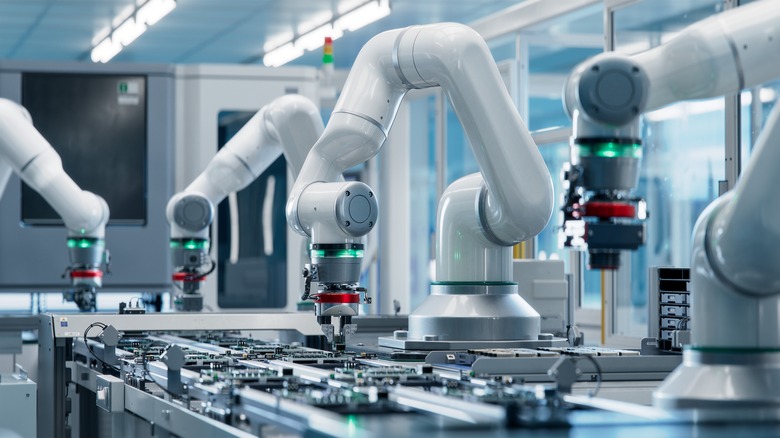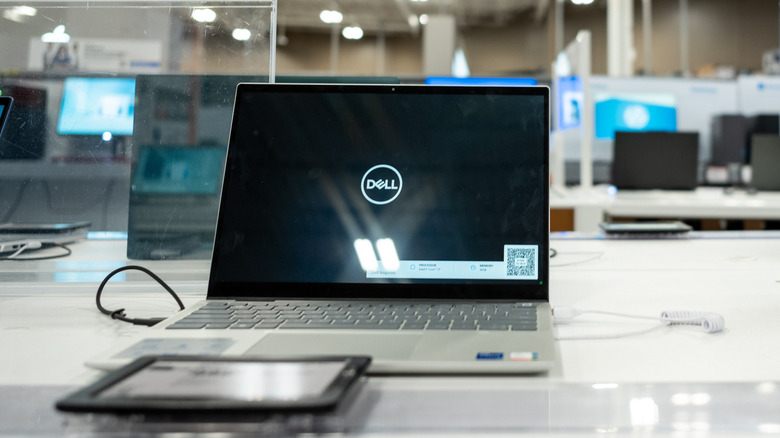Here's Where Dell Computers And Laptops Are Made Today
In 1984, University of Texas pre-med student Michael Dell began his journey of building Dell Technologies. At first, he was simply building and selling computers to his college community. At 19 years old, he dropped out of school and founded PC's Limited in 1985. In the same year, PC's Limited released its first computer system: the Turbo PC. In 1988, PC's Limited changed its name to what is now the global brand we know today — Dell Computer Corporation.
Since then, Dell has become a global powerhouse in the personal computer segment. In 2023, it was named as one of the top three PC vendors in the world, according to Statista. In addition, Michael Dell has not only become a billionaire, but he also cemented his status as a born and bred American entrepreneur. In his native town of Austin, Texas Monthly claims that early investors and employees with stock options in Dell have led to "Dellionaires," which have subsequently funded a lot of development in the area, such as public libraries, art museums, and schools.
Given Dell's roots as an American company, one might wonder if its products continue to be made with American hands. After all, there might be some additional benefits in terms of returns, repair, or access to parts. Unfortunately, the answer might surprise you.
Dell's global manufacturing strategy
In such a globalized world, it is impossible to build electronics from scratch from a single source. After all, the cost of shipping materials may not be ideal, or there might be a preference for local skilled workers. For this reason, many tech companies like Dell have optimized the manufacturing processes to generate more profit by moving manufacturing and assembly abroad.
Dell's public supplier list categorizes suppliers into three types: final assembly, original design manufacturers (ODM), and materials. Aside from the United States, Dell's ODM and final assembly facilities are in China, Vietnam, Taiwan, Mexico, Brazil, Ireland, Malaysia, India, Poland, and Thailand.
In the list provided by Dell, only two facilities owned by Dell in North Carolina and Massachusetts were tagged under final assembly and/or original design manufacturers, with no listed notebooks or desktops. Although, it did include several direct material suppliers with addresses in the United States, such as Broadcom, Intel, and Micron.
In addition, it splits up the manufacturing of its various product lines across suppliers: That means the same Alienware Notebook could be produced in China, Vietnam, Brazil, India, Poland, Malaysia, or Mexico. However, it's important to note that Dell disclosed that this list is only up to 95% of its 2023 budget, so there might be other undisclosed suppliers in the United States or abroad.
Challenges with Dell's global supply chain
When it comes to global manufacturing, relationships between nations can influence access to your favorite products, impact recalls, or make products more expensive.
For example, Dell issued a worldwide recall for its laptops due to battery issues in 2006. Supplied by Japanese conglomerate Sony Corporation, some of the Dell laptop models that were affected at the time included the Latitude, Inspiron, XPS, and Precision devices. In the same year, analysts estimated the cost of the recall to have been up to $400 million, according to NBC News. It's not clear how much of this was shouldered by Dell or Sony. Regardless, Sony no longer appears in Dell's public supplier list, as of this writing.
In recent times, Dell has also felt the impact of the global chip shortage. Aside from the global COVID-19 pandemic, Fusion shares that the ongoing trade war and tariffs between the U.S. and China are partly responsible for increased raw material prices and supply hoarding.
In an interview with Forbes, the CFO of Dell Technology, Tom Sweet, shared that shortages led to a longer lead time for some of Dell's products, and made it difficult to forecast cash flow. Because of this, it's unsurprising that Nikkei reported that Dell has been making moves to reduce reliance on Chinese manufacturers for its components in 2023. However, Wu Dongmei, senior global vice president at Dell Technology Group, refuted this claim in an interview with China Daily months later, claiming that Dell would struggle finding an alternative supplier in the short term.


